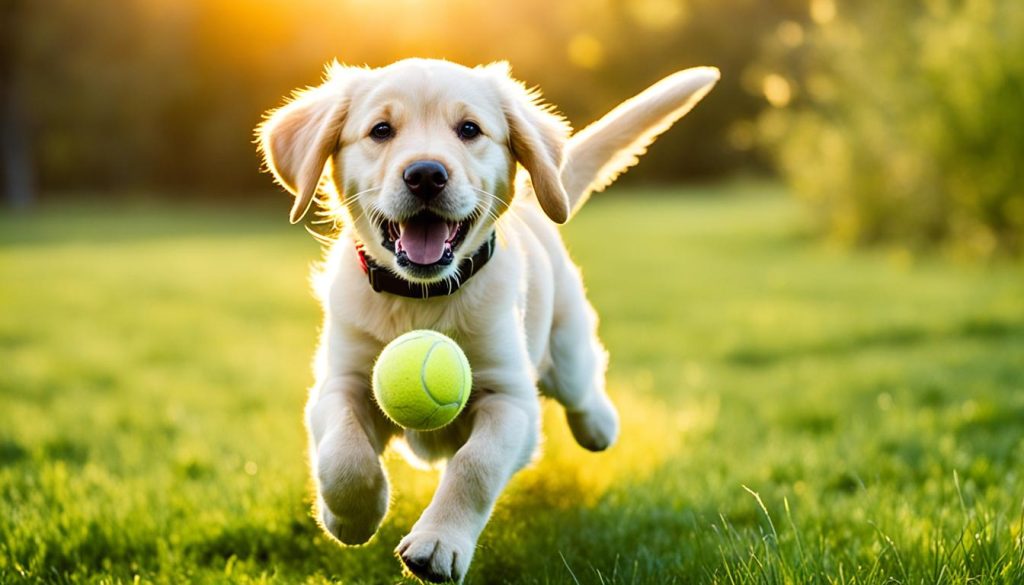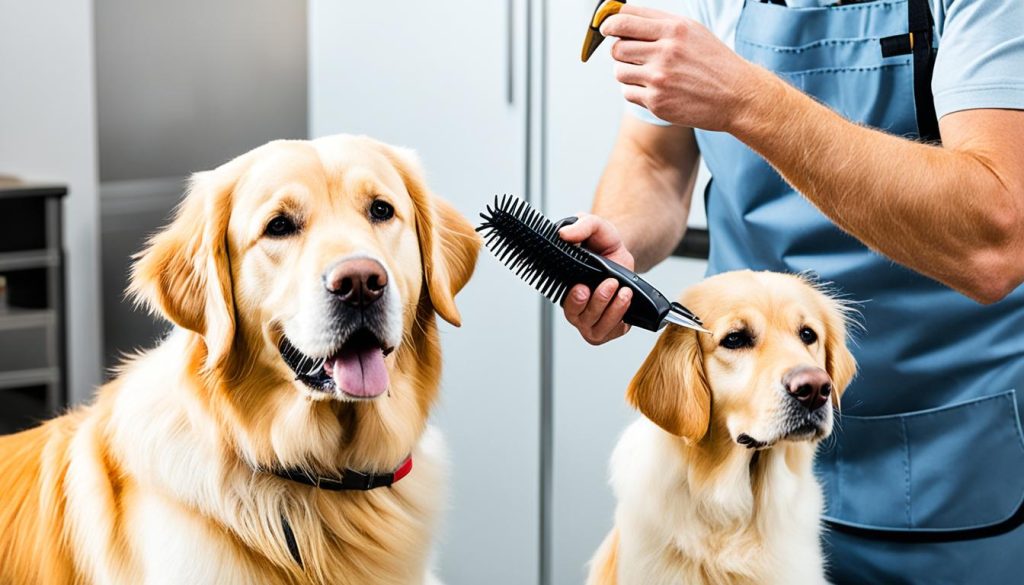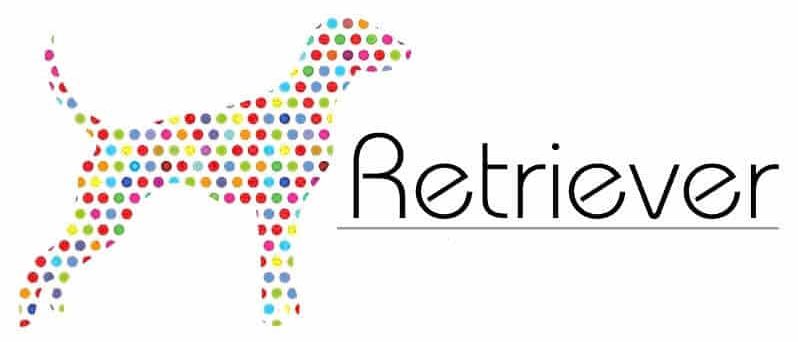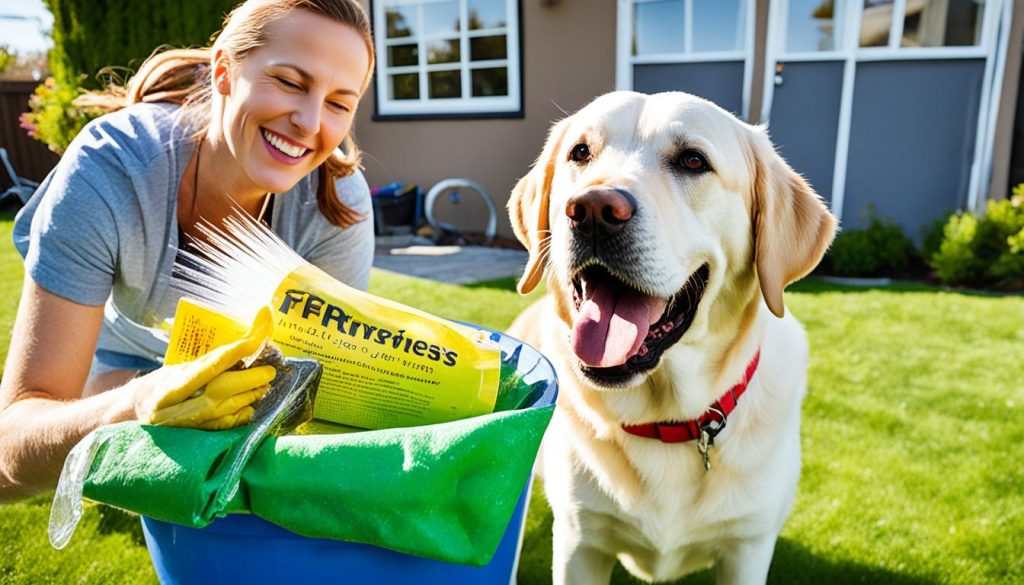Adopting a Labrador Golden Retriever entails a commitment to an exquisite mix of loyalty, energy, and love. These endearing companions combine remarkable traits from both the Labrador and the Golden Retriever. They stand among the most beloved canine breeds. Ensuring their welfare necessitates a profound comprehension of their innate attributes and potential health challenges.
Specialist guidance in canine welfare sheds light on the specific care needs of these lively and friendly dogs. This manual is enriched with expertise to enhance the health of your Labrador Golden Retriever. It ensures their natural warmth and enthusiasm thrive under your care.
Key Takeaways
- Pet care for Labrador Golden Retrievers must be adapted to their specific breed needs.
- Understanding the health issues that can affect these dogs is crucial for their long-term well-being.
- Knowledge of both the Labrador Retriever and Golden Retriever traits provides the foundation for superior care.
- An emphasis on tailored strategies in pet care effectively sustains the physical and mental health of the Labrador Golden Retriever.
- Expert advice aids in nurturing a well-balanced and content Labrador Golden Retriever.
Understanding Labrador Golden Retriever Characteristics
The Labrador Golden Retriever, a hybrid, marries the traits of two venerable breeds, warranting an exploration into its essence. This analysis shines a spotlight on the breed’s inception and its historical narrative. It elaborates on unique physical characteristics and examines behavioral patterns. Such scrutiny offers insights for both prospective and current owners.
Breed Origins and History
The ancestors of the Labrador Golden Retriever stem from devoted breed clubs and comprehensive archival documents. Emerging from the union of the industrious Labrador Retriever and the congenial Golden Retriever, the hybrid boasts a noble lineage. Its creation was intentional, aiming to forge a breed enhanced in both function and temperament.
Distinctive Physical Features
To distinguish the Labrador Golden Retriever among numerous breeds, observe its notable attributes. These include a robust build, a dense, water-repellent double coat, and a color palette spanning light to dark gold. Such traits not only accentuate the breed’s allure but also signify its versatility and operational competence.
Temperament and Behavioural Traits
The disposition of the Labrador Golden Retriever is invariably affable and genial, distilled qualities that make them favourable as family pets. Their intrinsic adaptability and marked intelligence fuel a zest conducive to diverse engagements and abundant companionship. Grasping these behavioural nuances is pivotal for their holistic care and familial inclusion.
| Breed Attribute | Characteristic |
|---|---|
| Size | Medium to large, strong build |
| Coat | Thick, water-repellent double coat |
| Colour | Variations from light cream to deep golden |
| Temperament | Amiable, intelligent, adaptable |
| Energy Level | High, requires daily exercise |

Essential Pet Care Strategies for Labrador Golden Retrievers
To maintain a Labrador Golden Retriever’s health, a profound comprehension of grooming and pet care is required. This structured strategy enhances the dog’s appearance and acts as a preventative measure against health issues. In the subsequent text, we explore strategies that intertwine grooming with comprehensive care. This ensures these vibrant canines lead fulfilling lives.
The double coat of these dogs demands regular brushing to reduce shedding and maintain the coat’s shine. This routine is pivotal in early detection of skin issues or parasites. Bathing should be moderated to prevent the loss of coat oils, while ensuring cleanliness. Achieving a balance is essential for optimal skin and coat health.
Proper nutrition significantly impacts the health of a Labrador Golden Retriever. A nutrient-rich diet supports their energy needs. Attention to caloric intake is necessary to prevent obesity and related health problems. The diet must be tailored to the dog’s life phase, activity levels, and any specific health needs, including allergies.
Preventative pet care includes routine veterinary assessments to screen for common health issues. Conditions such as hip dysplasia, cardiac diseases, and eye problems require attention in this breed. Early diagnosis during regular vet visits facilitates better management or prevention of these issues.
Regular physical activity is crucial for Labrador Golden Retrievers. It aids in preventing obesity and joint issues, while suiting their energetic temperament.

| Grooming Technique | Frequency | Benefits |
|---|---|---|
| Brushing | 2-3 times a week | Reduces shedding, maintains coat health |
| Bathing | Every 1-2 months | Keeps coat clean, prevents skin infections |
| Nail Trimming | Monthly | Prevents overgrowth, protects paw health |
| Ear Cleaning | Every 4-6 weeks | Reduces risk of ear infections |
| Dental Care | Daily | Prevents oral diseases, maintains overall health |
To conclude, the radiant health of a Labrador Golden Retriever depends on harmonized grooming, optimal nutrition, and proactive health care. Owners should adapt these practices to meet their pet’s specific needs. This approach assures a joyful and healthy existence for their cherished companions.
Training and Socialising Your Labrador Golden Retriever
A Labrador Golden Retriever embodies boundless energy and affection. Harnessing these traits requires commitment to structured training and conscientious socialisation. We advocate a holistic methodology, amalgamating obedience training with socialisation techniques, to cultivate a well-rounded pet. This discourse offers expert guidance on foundational training principles, ensuring your dog matures into a sociable, obedient family member.
Basics of Obedience Training
Obedience training is pivotal for a harmonious dog-owner relationship. This process
enables reliable response to commands, safeguarding the pet and public’s well-being. Experts advocate for consistent routines and positive reinforcement. Mastery of basic commands like ‘sit’, ‘stay’, ‘come’, ‘heel’ is fundamental to your Labrador Golden Retriever’s regime.
Advanced Training Techniques
Post mastering basic obedience, Labrador Golden Retrievers are ripe for advanced challenges. Such training encompasses agility exercises, scent detection, and therapy dog preparation. These stimulating activities offer mental and physical engagement. Tailoring these techniques to your dog’s unique inclinations ensures sustained interest and learning enthusiasm.
Socialisation Tips for Puppies and Adults
Socialisation critically influences a Labrador Golden Retriever’s interactions and adaptability. For puppies, it includes exposure to varied settings, beings, and humans, to nurture positive experiences. Continual socialisation for adult dogs is crucial for preserving their sociable demeanor. Introducing new experiences in a controlled, positive manner develops a confident, well-adjusted companion, adept in worldly navigation.
Conclusion
The care journey of a labrador golden retriever intertwines joy with responsibility. The breed’s characteristics form the bedrock of their health and happiness. Professional insights from this guide empower owners for precise care. These canines demand comprehensive attention to their health, training, and social facets.
The labrador golden retriever’s distinct needs arise from their mixed heritage. A tailored approach in grooming, diet, and health surveillance is vital for their wellbeing. Moreover, patient training and extensive socialisation opportunities are crucial. These efforts ensure the development of a balanced companion.
Life with a labrador golden retriever offers unparalleled fulfillment. Adherence to this guide’s care strategies yields a thriving, energetic, and friendly canine companion. Such commitment not only elevates the labrador golden retriever’s quality of life but also enhances that of their human companions. At the core of successful pet care lies a symbiosis fostered by love, comprehension, and reciprocal respect.
FAQ
What are the main characteristics of the Labrador Golden Retriever?
The Labrador Golden Retriever, an amalgamation of Labrador and Golden Retriever traits, is distinguishable by its amicable and docile nature, sharp intelligence, and considerable vitality. This breed demonstrates a robust inclination for work, affability, and suitability for family life.
How should I address the grooming needs of a Labrador Golden Retriever?
Possessing a dual-layered coat, the Labrador Golden Retriever necessitates routine grooming. Regular brushing several times weekly mitigates shedding and averts tangles. Baths ought to be administered as needed, complemented by consistent ear cleaning and nail trimming, to uphold their grooming standards.
Are there common health issues I should watch out for in Labrador Golden Retrievers?
This breed may face potential health issues including hip and elbow dysplasia, cardiac conditions, and ocular disorders. A regimen of healthy eating, steady exercise, and routine veterinary assessments is critical to reduce these risks. Prompt detection and preventive healthcare are paramount for their wellbeing.
What is the best way to train a Labrador Golden Retriever?
Commence with fundamental obedience training, setting forth unambiguous commands and routines. Due to their intellectual capacity, Labrador Golden Retrievers exhibit positive responses to constructive reinforcement techniques. After mastering basic skills, progress to more complex training to maintain their mental and physical engagement. Training requires consistency and patience.
How important is socialisation for Labrador Golden Retrievers, and when should it begin?
Socialisation is imperative for Labrador Golden Retrievers, commencing in their formative stages. Initial socialisation assures the pup’s development into well-adjusted adults, comfortable across diverse scenarios, environments, and in the presence of various entities. Persistent socialisation throughout their lifespan is essential to preserve their sociability.
Can Labrador Golden Retrievers adapt to living in an apartment?
While ideally suited to more spacious residences, Labrador Golden Retrievers can acclimatise to apartment habitat, conditional on adequate physical activity and mental stimulation. Regular ambulatory activities, interactive play, and training exercises are indispensable to sustenance of their physical and mental health in constrained spaces.
How often should a Labrador Golden Retriever be fed, and what type of diet is best?
The feeding regimen of a Labrador Golden Retriever varies with age, stature, and energy expenditure, typically involving high-quality canine nourishment bi-daily. Optimal diet planning aligns with their specific dietary and health necessities. Uninterrupted access to fresh water and veterinary dietary consultation are advisable for individualised alimentation strategies.
What activities do Labrador Golden Retrievers enjoy?
Engaging vigorously in physical pursuits like swimming, fetch, and trekking, Labrador Golden Retrievers also revel in cognitive challenges from puzzle toys, obedience schooling, and agility drills. These ventures not only facilitate physical exertion but also enrich their cognitive faculties.
How do I ensure my Labrador Golden Retriever has a healthy weight?
Achieving a healthy weight for your Labrador Golden Retriever involves meticulous exercise, meal portion management, and snack moderation. Veterinary consultations afford weight monitoring while advising on a bespoke diet and exercise regimen befitting your canine’s specific requirements.
How long do Labrador Golden Retrievers live?
Labrador Golden Retrievers typically have a lifespan ranging from 10 to 12 years. Genetic makeup, nourishment, healthcare, and living environment are influential factors on longevity. A caring environment and appropriate upkeep can contribute to extending their duration of life.

